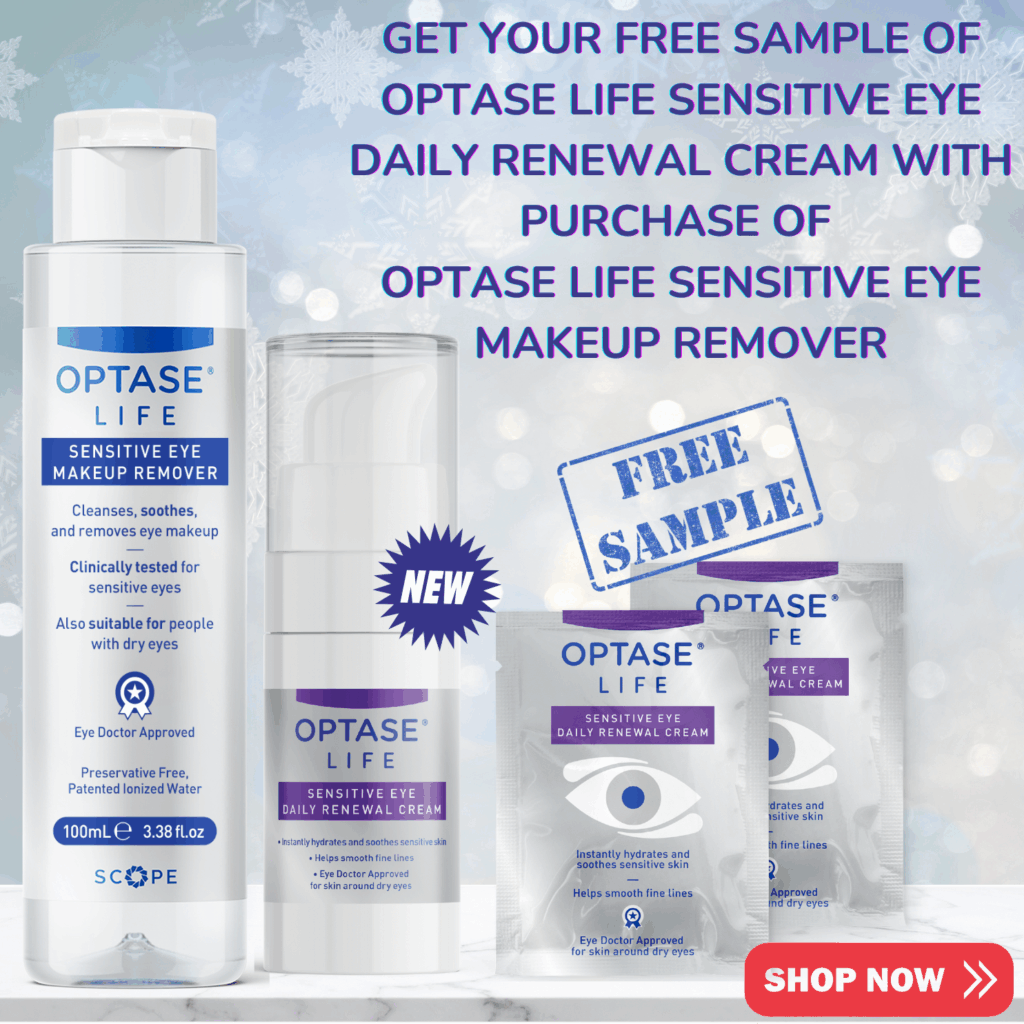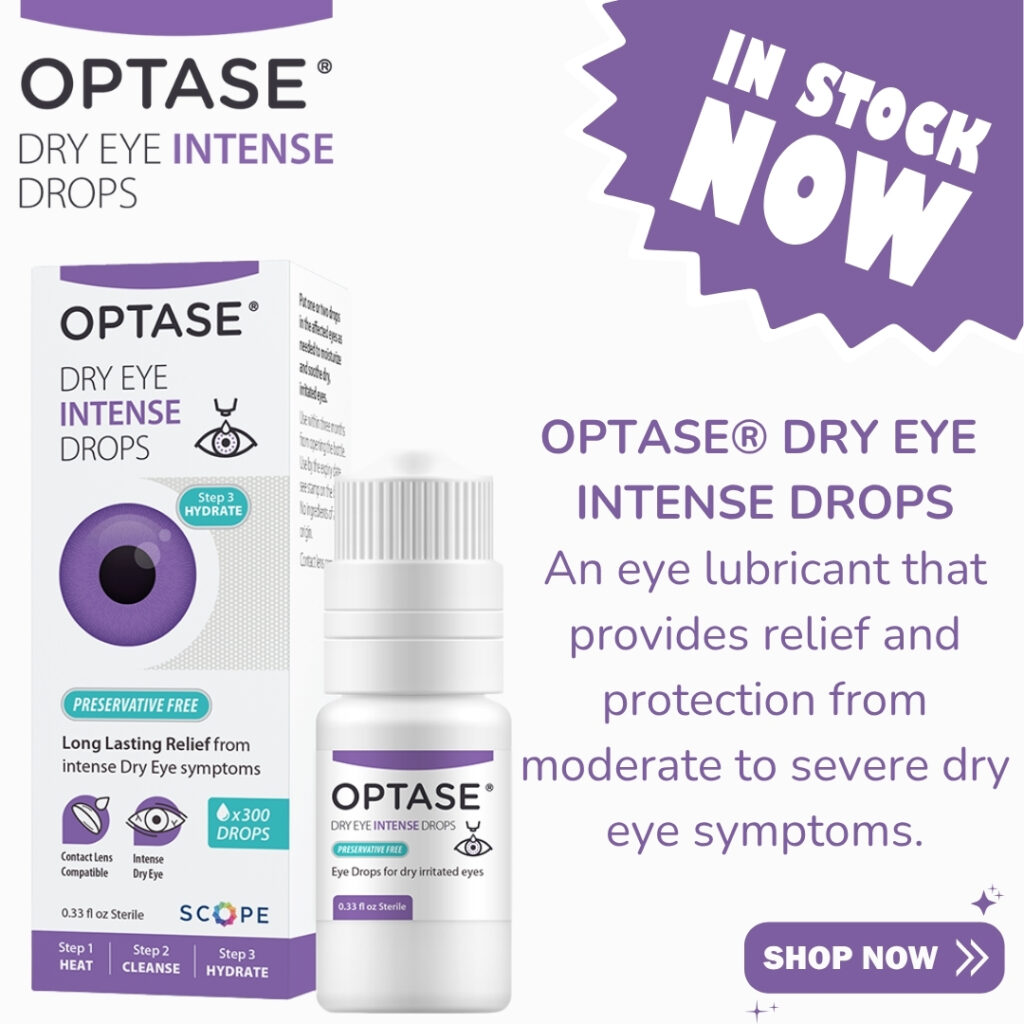After a long day, your nighttime routine probably feels like a soothing and welcome ritual removing makeup, cleansing your skin and gently patting on a nourishing eye cream before bed. But if you struggle with dry or sensitive eyes, this routine can sometimes backfire. Traces of makeup, leftover preservatives from removers, or certain ingredients in creams can linger around the delicate eye area and migrate into the eyes overnight, leading to irritation, discomfort and worsening dryness. So if you’ve ever wondered, “Can eye cream cause dry eyes?”, the answer – unfortunately – is yes. The good news though is that with the right eye cream and a little OPTASE know-how, you can enjoy the benefits of your evening skincare ritual without compromising your eye health.
Eye Cream and Dry Eyes – What’s the Connection?
Why the Eye Area is so Sensitive
The skin around your eyes is completely different from the rest of the skin on your face. It’s much thinner, has fewer oil glands and sits right beside the tear film which is the delicate layer that keeps your eyes comfortable, hydrated and protected. Because this skin is so fine, it doesn’t take much for any products you use to affect it. Even trace amounts of makeup residue or an unsuitable eye cream can spread across the eyelid, disrupting the tear film and leaving your eyes feeling dry, irritated, or watery.
How Ingredients Migrate to the Ocular Surface
Basically, what you put around your eyes doesn’t always stay put. The Tear Film & Ocular Surface Society (TFOS) has highlighted how everyday products can end up in the tear film and upset its balance. Over time, this kind of contamination can make dryness worse, irritate the surface of your eye and even impact the tiny oil glands along the eyelid that help keep tears from evaporating.
In short, while your nighttime skincare ritual may feel soothing, the wrong products can quietly undermine your eye comfort. But how do you know which ingredients to avoid in an eye cream? Read on to find out!
Common Eye Cream Ingredients that can Worsen Dry Eyes
Preservatives
Preservatives are added to most creams and removers to stop bacteria from growing once the product is opened. While they’re important for shelf life, some preservatives in eye cream – like phenoxyethanol and parabens – can be irritating to sensitive eyes. These ingredients may be harsh on the delicate skin around the eyelids and, if they make their way into the tear film, they can increase inflammation or dryness. For people already prone to sensitive or dry eyes, this low-level irritation can make symptoms worse over time.
Fragrance & Perfumes
That “luxury” scent in many creams often comes at a cost. Although technically these are safe eye cream ingredients, fragrance and perfumes are among the most common causes of skin sensitivity and allergic reactions which is why it can be worthwhile to seek out fragrance-free eye cream for dry eyes. The skin around your eyes is thinner and more sensitive, so even small amounts can cause itching, redness, or watery eyes. Because fragrances are mixtures of many chemicals, they can also act as hidden irritants once they spread towards the eyes overnight.
Active Anti-Aging Ingredients (AHAs, Retinoids)
Anti-aging ingredients like alpha hydroxy acids (AHAs) and retinoids are popular for their skin-renewing effects, but they can be too strong for the delicate eyelid area. These ingredients may cause irritation, peeling or burning sensations when applied too close to the eyes. On top of this type of eye cream causing dry eyes, any residue that migrates into the tear film can further disrupt comfort, leading to even more dryness and sensitivity.
Signs Your Eye Cream May Be Harming, Not Helping
Stinging or Burning after Application
In spite of what you might think, a quick sting or burn when you apply cream isn’t “normal” but can be a sign that the ingredients are irritating sensitive eyelid skin or seeping into your eye and whatever you’re using isn’t the best eye cream for sensitive eyes.
Redness, Itching or Dry Flakes around the Eyelid
If the skin around your eyes looks red, itchy, or starts to flake, your cream may be too harsh for this delicate area.
Increased Watering or Grittiness
Eyes that suddenly feel watery, gritty, or “tired” after your skincare routine may be reacting to product residue reaching the tear film.
Needing Eye Drops More Often After Using Creams
If you find yourself reaching for artificial tears more often since starting a new eye cream, it may be drying your eyes instead of supporting them.
How to Choose a Safe, Soothing Eye Cream for Sensitive Eyes
Look for “Preservative-Free” and “Fragrance-Free” Labels
When it comes to sensitive eyes, less is often more. Products labelled preservative-free and fragrance-free help reduce the risk of irritation. Minimal ingredient lists and “clean-label” formulations mean fewer potential irritants near your eyes, lowering the chance of stinging, redness, or dryness.
Pick Products Designed for the Eye Area, Not Just “Gentle”
Not all facial creams are safe for the eyelids. Even products marketed as “gentle” can contain ingredients that are too strong for the thin, delicate skin around your eyes. Eye-specific formulations are tested to be compatible with the periocular area and the tear film, helping protect your eyes while still providing hydration and care.
Talk to Your Eye Doctor or Dermatologist
If you experience persistent dryness, irritation, or other unusual symptoms, professional guidance is key. An optometrist or dermatologist can help identify triggers, suggest safer products and recommend strategies to protect both your eyes and the surrounding skin.
Why OPTASE LIFE Is Different
Developed by Eye Experts and Recommended by Eye Doctors
OPTASE LIFE isn’t just another eye care line – it’s developed by eye care experts, dermatology and eye doctor tested. Every product is formulated to be safe for the delicate eye area, while supporting healthy looking periocular skin.
Only 13 Clean Ingredients – 50% Less Than Competitors
OPTASE LIFE keeps it simple with just 13 carefully selected, clean ingredients. Key components like Active Ionized Water, almond oil (allergy protein free)and mineral salts hydrate, soothe and protect without leaving harsh residues. Fewer ingredients mean less risk of irritation or allergic reactions, making it ideal for skin use around dry and sensitive eyes.
Clinically Tested for Dry & Sensitive Eyes
OPTASE LIFE products are clinically tested and developed by eye care experts to use for skin use around dry and sensitive eyes. The Sensitive Eye Makeup Remover is designed to gently remove makeup without irritating the tear film, while the Daily Renewal Cream PF provides hydration and comfort to the delicate periocular skin, helping to support healthy looking eyelids and reduce dryness.
Part of a Proactive Eye Care + Skincare Routine
Together, the OPTASE LIFE Sensitive Eye Makeup Remover and Daily Renewal Cream PF form a complete, proactive routine. By gently removing makeup and then nourishing the skin without harsh ingredients, OPTASE LIFE helps eyes feeling comfortable night after night.
Conclusion
Dry, sensitive eyes can make even the most relaxing nighttime routine uncomfortable. From stinging and redness to dryness and irritation, the wrong products around your eyes can do more harm than good. The good news is that caring for your eyes doesn’t have to mean compromising on skincare. By choosing gentle, eye-specific formulations like OPTASE LIFE Daily Renewal Cream, you can help to nourish your skin around the eyes. After all, healthy eyes are beautiful eyes.
Want relief without compromise? Explore the OPTASE LIFE Daily Renewal Cream, trusted by eye care professionals for dry and sensitive eyes.


